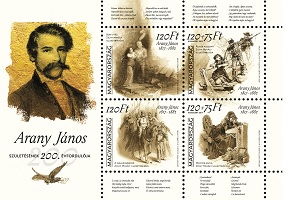
Arany János születésének 200. évfordulója kisív
Ifjúságért 2017
A Magyar Posta 2017-ben is folytatja az immáron több évtizedes hagyománnyá vált ifjúsági bélyeggyűjtés támogatására megjelenő feláras bélyegek kiadását. Az idei év témája – kapcsolódva az Arany János-emlékévhez – Arany János születésének 200. évfordulója. A négy bélyegképet tartalmazó kisív két címletéhez kapcsolódó felár összegét, összesen 150 Ft-ot a Magyar Posta az ifjúsági bélyeggyűjtés támogatására fordítja. A bélyegkisívet Gilicze Gergő grafikusművész tervei szerint 30 000 példányban az ANY Biztonsági Nyomda Nyrt. gyártotta, és július 10-től kapható.

Arany János (Nagyszalonta, 1817. március 2. – Budapest, 1882. október 22.) a magyar irodalom egyik legismertebb és legkiemelkedőbb szereplője. Irodalmi pályafutása 1846-ban Az elveszett alkotmány című szatirikus eposszal indult, de igazán ismertté a Toldi című művével vált, mellyel elnyerte a Kisfaludy Társaság 1847. évi pályadíját. A Toldi nem csak pályadíjat, hanem Petőfi Sándor barátságát is meghozza számára, levelezésük ma már komoly irodalomtörténeti érték.
Már pályája kezdetén is foglalkozott közélettel, és politikai tárgyú cikkeket írt, az 1848–49-es forradalom és szabadságharc alatt nemzetőrként szolgált, majd a Szemere Bertalan által vezetett Belügyminisztériumban volt fogalmazó. A bukást követően egy ideig bujdosott, de – mivel jelentékeny politikai szerepe nem volt – végül elkerülte a megtorlást, és Nagykőrösre költözött, ahol 1851 és 1860 között gimnáziumi tanári állást vállalt. Itt születtek költészetének első csúcsát jelentő versei, a székely és skót népi hagyományokból merítő balladái. Ez volt legtermékenyebb alkotói időszaka és ezek a művek tették lehetővé, hogy a Kisfaludy Társaság meghívja ügyvezető igazgatónak, majd a Magyar Tudományos Akadémia tagjaként az Akadémia főtitkára lett.
Már életében halhatatlannak számított. Nagy epikai műveiben – a Toldi verses regényhármasában és a Buda halálában – illetve a művészi tökéllyel kiformált balladáiban kora világirodalmának szintjére emelte a lélekábrázolást. Nagy és sokoldalú szellemi műveltségre tett szert, a latin, a görög, a német, az angol és a francia irodalom remekeit eredetiben olvasta, és Shakespeare fordításai ma már klasszikusnak számítanak.
Ő a magyar nyelv egyik legnagyobb ismerője, és ehhez mérten páratlanul gazdag szókinccsel rendelkezett. Költeményeiben majdnem 60 ezer egyedi szót használt, ha pedig a ragozott formákat nem tekintjük külön szónak, akkor valamivel több, mint 16 ezret – ami azt jelenti, hogy őt tekinthetjük a leggazdagabb szókincsű magyar költőnek.
A bélyeggrafikák alapjául Arany János négy balladájához – Bor vitéz, Ágnes asszony, A walesi bárdok és Mátyás anyja – kapcsolódó Zichy Mihály illusztrációk szolgáltak. A keretrajzot a balladákból vett idézetek és az Arany János-emlékév arculati elemei egészítik ki – melyek az alkalmi borítékot is díszítik. Az alkalmi bélyegzőn Arany János aláírása jelenik meg.
Forrás: Posta
János Arany was born 200 years ago sheet
For youth 2017
Magyar Posta is continuing its decades-long tradition of issuing stamps with a surcharge in order to support youth stamp collecting again in 2017. The theme this year is the bicentenary of the birth of János Arany, which is linked with the János Arany Memorial Year. Magyar Posta devotes the amount of the surcharge on two stamps of the four-stamp miniature sheet, a total of HUF 150, to supporting youth stamp collecting.

János Arany (Nagyszalonta, 2 March 1817 – Budapest, 22 October 1882) is one of the best known and most outstanding figures in Hungarian literature. His literary career began in 1846 with the satirical epic poem The Lost Constitution but it was only when Arany’s major epic poem Toldi won the Kisfaludy Society’s prize in 1847 that he became truly well-known. Toldi won him not only a prize but also the friendship of another celebrated poet of the age, Sándor Petőfi, and their correspondence is a highly valued part of Hungarian literary history.
Arany was involved in public life even at the start of his career and wrote articles on politics. He served as a member of the national guard during the 1848 Revolution and War of Independence, and then worked drafting documents in the Ministry of Internal Affairs led by Bertalan Szemere. After the fall of the War of Independence, he went into hiding for a while but, as he had not played a significant political role, he avoided the reprisals and moved to Nagykőrös, where he taught in the grammar school between 1851 and 1860. There the poems representing the first peak of his poetry were written, including his ballads drawing on Transylvanian and Scottish folk traditions. This was his most productive creative period and it was because of these works that he was invited to become the director of the Kisfaludy Society and later a member and then the secretary general of the Hungarian Academy of Sciences.
He was considered immortal even during his lifetime. In his great epic works – the Toldi trilogy and The Death of King Buda – and in his ballads crafted to artistic perfection, he raised the depiction of the inner person to the standard of the world literature of his age. He acquired great intellectual versatility and became highly erudite, reading the masterpieces of Latin, Greek, German, English and French literature in the original. His translations of Shakespeare are classics in their own right today.
Arany was a true master of the Hungarian language and had an unparalleled vocabulary. His poetry contains almost 60,000 individual words, and over 16,000 if conjugated and inflected forms are excluded, which means that he can be considered the Hungarian poet with the richest vocabulary.
The basis of the stamp designs were illustrations by Mihály Zichy, a contemporary painter, made for Arany’s four ballads – The Hero of Bor, Mistress Agnes, The Bards of Wales and The Mother of King Matthias. The frame is decorated by quotations from the ballads and the elements profiling the János Arany Memorial Year, which also appear on the first day cover. The poet’s signature is used for the commemorative postmark.
Source: Posta










